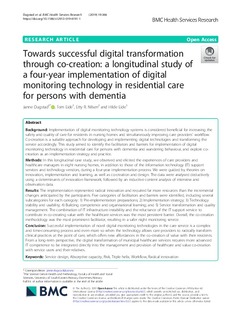Towards successful digital transformation through co-creation: a longitudinal study of a four-year implementation of digital monitoring technology in residential care for persons with dementia
Journal article, Peer reviewed
Published version

View/
Date
2019Metadata
Show full item recordCollections
Abstract
Background:
Implementation of digital monitoring technology systems is considered beneficial for increasing the safety and quality of care for residents in nursing homes and simultaneously improving care providers’ workflow. Co-creation is a suitable approach for developing and implementing digital technologies and transforming the service accordingly. This study aimed to identify the facilitators and barriers for implementation of digital monitoring technology in residential care for persons with dementia and wandering behaviour, and explore co-creation as an implementation strategy and practice.
Methods:
In this longitudinal case study, we observed and elicited the experiences of care providers and healthcare managers in eight nursing homes, in addition to those of the information technology (IT) support services and technology vendors, during a four-year implementation process. We were guided by theories on innovation, implementation and learning, as well as co-creation and design. The data were analysed deductively using a determinants of innovation framework, followed by an inductive content analysis of interview and observation data.
Results:
The implementation represented radical innovation and required far more resources than the incremental changes anticipated by the participants. Five categories of facilitators and barriers were identified, including several subcategories for each category: 1) Pre-implementation preparations; 2) Implementation strategy; 3) Technology stability and usability; 4) Building competence and organisational learning; and 5) Service transformation and quality management. The combination of IT infrastructure instability and the reluctance of the IT support service to contribute in co-creating value with the healthcare services was the most persistent barrier. Overall, the co-creation methodology was the most prominent facilitator, resulting in a safer night monitoring service.
Conclusion:
Successful implementation of novel digital monitoring technologies in the care service is a complex and time-consuming process and even more so when the technology allows care providers to radically transform clinical practices at the point of care, which offers new affordances in the co-creation of value with their residents. From a long-term perspective, the digital transformation of municipal healthcare services requires more advanced IT competence to be integrated directly into the management and provision of healthcare and value co-creation with service users and their relatives.
Description
Open Access This article is distributed under the terms of the Creative Commons Attribution 4.0 International License which permits unrestricted use, distribution, and reproduction in any medium, provided you give appropriate credit to the original author(s) and the source, provide a link to the Creative Commons license, and indicate if changes were made. The Creative Commons Public Domain Dedication waiver applies to the data made available in this article, unless otherwise stated.
